Annual Pilgrimage to Glastonbury
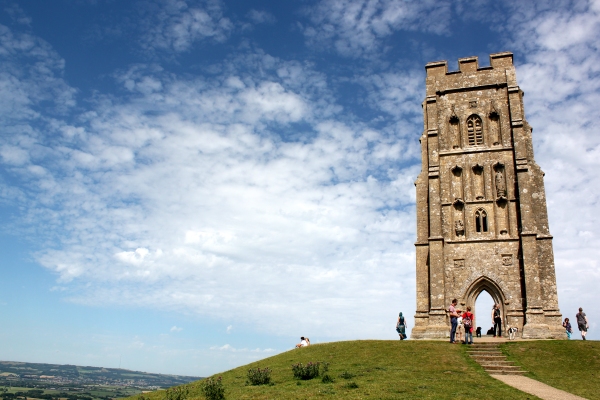
Abba Seraphim led a pilgrim group to Glastonbury. Under the expert guidance of Subdeacon Paul Ashdown, on 10 June the group were conducted on a very thorough tour of the archaeological and historical sites of the Abbey, after which they visited the Catholic Shrine of Our Lady of Glastonbury. In the afternoon they climbed St. Michael’s Tor, where the refreshing winds compensated for the heat of the day. The following morning, 11 July, Abba Seraphim celebrated the Divine Liturgy in the Undercroft of St. Mary’s Chapel in Glastonbury Abbey, assisted by Father Simon Smyth, Deacon Anthony Holland and Subdeacons Paul Ashdown and Trevor-James Maskery. During the Liturgy, Dominic George was ordained as a Reader to serve the Bristol Mission. As the schedule for the Anglican celebration of the Pilgrimage had been changed from previous years and because he needed to return to London, Abba Seraphim was not able to attend the Anglican Eucharist in the afternoon, but sent Deacon Anthony and Subdeacon Paul to represent him, bearing one of the prosphoras from the morning Liturgy as a sign of fellowship.
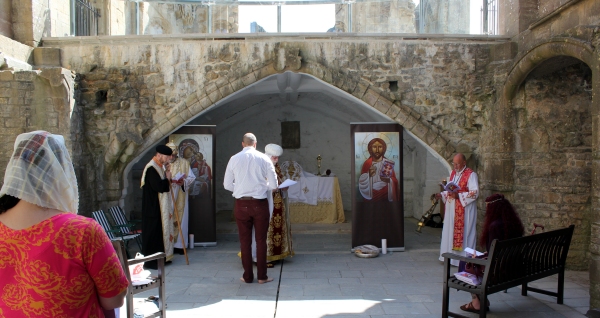
Another two baptisms in Portsmouth
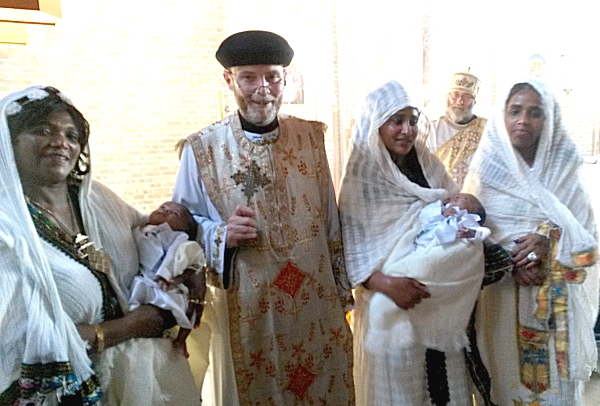
Following the one adult, two children and two babies, all five female, baptised in the previous Portsmouth Liturgy twin boys Behaylizgi Kibron and Temesgen Kibron were baptised and chrismated in the Church of Saint Mary the Mother of God and Saint Moses the Black on Saturday 4th July. A packed congregation of around eighty witnessed and supported the baby boys and their family and enthusiastically welcomed them into membership of the Church, the Body of Christ.
At the conclusion of the Liturgy Father Simon gave two Ethiopian icons to the family, one for each boy. One was of the Archangel Michael with his drawn sword standing over and protecting the suppliant who had sought his intervention. Behind the archangel stood other angels. This icon was for Temesgen whose name has meanings of fullness and reflected a desire that he might enjoy the fullness of God’s blessings with the archangel and all the heavenly host praying for him and watching over him. Behaylizgi refers to the arm of God or strength of God. The icon given for him was the crucifixion with our Lord hanging on the cross which when we learn to look at with Christian eyes we see not so much weakness in the death of Christ but the power and strength of God in overcoming and defeating death and the devil. However apparently contradictory to one who does not believe in Christ, to a Christian an icon of the crucifixion is as much a declaration of the strength and power of God as is an icon of the resurrection. This is reflected in one of the many Old Testament readings from Good Friday (from Isaiah) speaking of our Saviour’s clothing being red like one who had trodden the wine grapes and being stained with blood and how of the people none was with Him, none to help therefore His own arm brought salvation. Father Simon’s explanation for the choice of the icons was clearly valued.
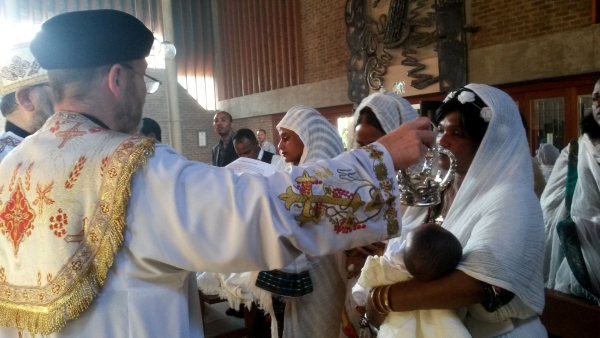
Following the Divine Liturgy Father Simon and Tasony Sheila Smyth together with Deacon Antony Holland were all invited to a celebration of this joyous occasion at which they were all three made extremely welcome and where they enjoyed generous helpings of traditional Ethiopian food.
Fr. Peter Farrington transfers to mission ministry under Pope Tawadros
For some time Father Peter has been conducting an energetic missionary ministry to support those seeking to learn more about Orthodoxy, especially centred on missions in Stoke-on-Trent, Swindon and Windsor. He has also served in Egypt and the Diocese of Milan. Having expressed the conviction that his future ministry should now be within the wider Coptic Church, he has requested to be released into the direct jurisdiction and care of His Holiness Pope Tawadros and to be obedient to His Holiness in regard to his future service. Accordingly Abba Seraphim signed a canonical release dated 3 July and commended Father Peter to the oversight of H.H. The Pope.
Bishop Angaelos awarded the O.B.E.
The news that His Grace Bishop Angaelos, General Bishop of the Coptic Orthodox Church, has been awarded the O.B.E. in the Queen’s Birthday Honours, has been widely welcomed by those working for reconciliation between faith groups. In a recent letter, Abba Seraphim wrote, “It is with great pleasure that I congratulate Your Grace on your recent nomination by the Prime Minister for the honour of an OBE in recognition of your services to International Religious Freedom. Your efforts over several years, which have increased in their impact as the situation for Christians in the Middle East and elsewhere has deteriorated so dramatically, are a very necessary witness to our Christian belief in love, forgiveness and reconciliation in the face of such terrible destructive cruelty. In addition to your public testimony, the practical application of our concern, through such bodies as the Asylum Advocacy Committee, with which I have been honoured to be associated since its inception, addresses the reality of human distress and offers compassion and justice to those in need. The widening of our remit to include other religions suffering persecution, rightly demonstrates our belief that God “so loved the world” and that all humanity is precious because of being created in His image. Your example, your vision and your commitment are all worthy of the well-deserved commendation made.”
A Reader ordained for the BOC Stoke Mission
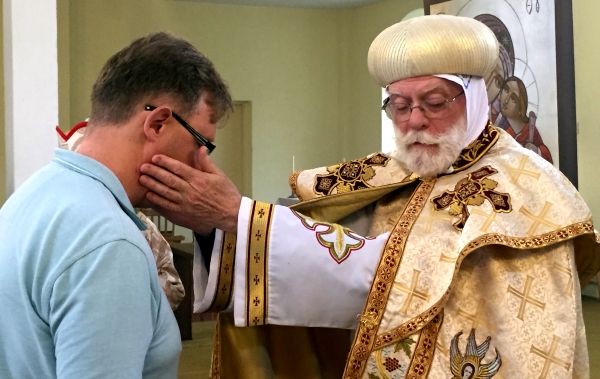
On 13 June, during the Divine Liturgy at St. George-in-the-East at Shadwell, Abba Seraphim ordained Philip Turner of Burslem as a Reader to serve the BOC Mission at Stoke-on-Trent. Philip, who has a B.Sc in Environmental Science is employed as a Community Support Worker in his home town and was in the first group of converts to join the Orthodox Mission. He will now lead the community in prayer in the absence of a priest. In his homily, Abba Seraphim spoke about the ministries of the church as part of the Ascension gifts of Christ. He noted that it was clear from his writings that the Apostle St. Paul saw these ministries as protecting the church from error, because if we are built up as the body of Christ we will no longer be children, “tossed to and fro and carried about with every wind of doctrine, by the cunning of men by their craftiness in deceitful wiles,” but rather, speaking the truth in love, we are to grow up in every way to him who is the head, into Christ “from whom the whole body, joined and knit together by every joint with which it is supplied, when each party is working properly, makes bodily growth and upbuilds itself in love.” This image of the joints of the body is organic, just as the church is intended to be. We need to discard the image of an organisation – like some modern international corporation – with its tiered hierarchical structure and its levels of managers reaching to the top. Abba Seraphim noted that although the church possesses an hierarchy, it is one of interdependance not subordination.
He also reminded the congregation that church history from apostolic times speaks of two Philips: Philip, one of the twelve apostles, who was martyred alongside St. Bartholomew; and Philip the Deacon and Evangelist, one of the seven chosen alongside St. Stephen, who converted the Ethiopian eunach by expounding the Scriptures to him. He prayed that Philip the Evangelist would be the new Reader’s patron, so that rather than merely being a lover of horses – as the name originally meant – he would be characterised as a lover of mankind – phil-anthropos – and may be faithful in his ministry, bearing Christ to all whom he meets, so that he might receive God’s mercy along with all those who have pleased God from the beginning.

Among the clergy assisting at the Liturgy was Father Shenouda Haile, Priest of the free Eritrean Orthodox Church in London, who brought with him some members of his community. There have been warm fraternal relations between the British and Eritrean Orthodox communities dating back to Abba Seraphim’s ordination as a Metropolitan in Cairo in 1994 at the same service in which the late Pope Shenouda ordained the future Patriarch Antonios to the episcopate.
